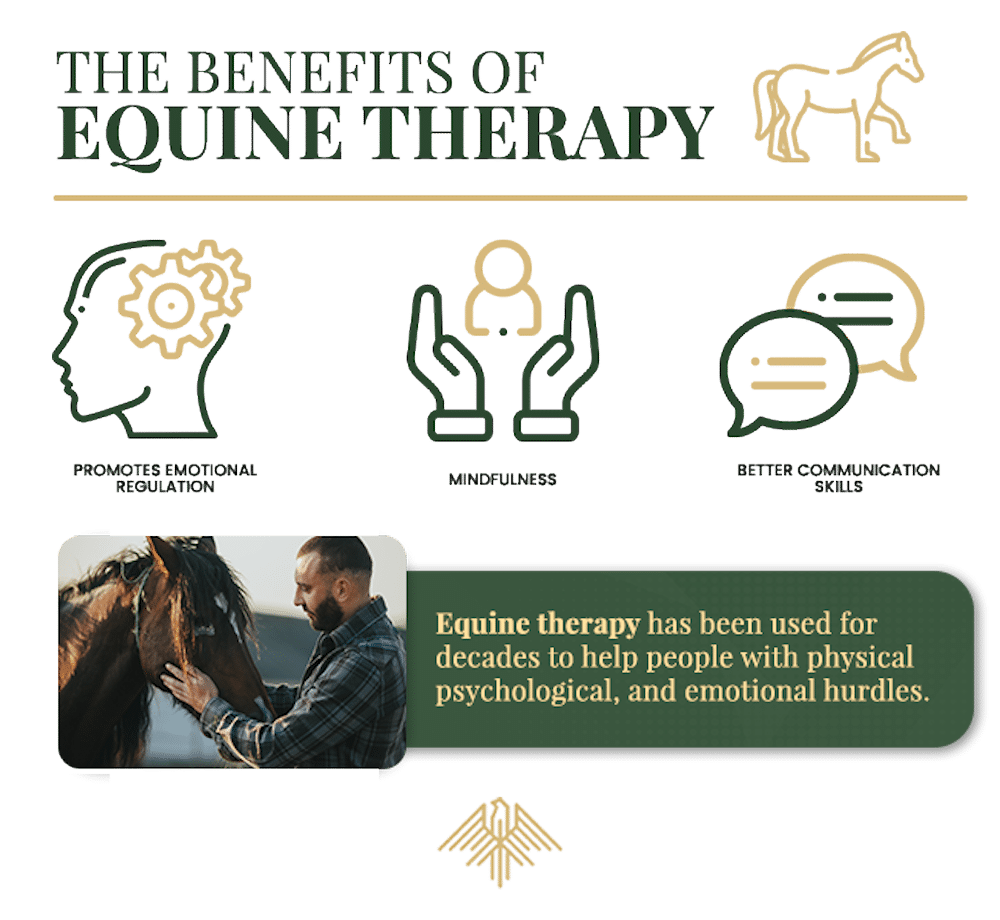What is Equine Therapy: A Guide

Ever wonder what equine therapy is all about or how it can help you? You’ve come to the right place. Equine therapy, a modality gaining recognition in the field of mental health, leverages the intuitive and non-judgmental nature of horses to create a dynamic and transformative therapeutic environment. It has a special way of connecting with humans that allows for breakthroughs and healing in a peaceful, natural setting.
Discover more about equine therapy and its multifaceted benefits at the Eagle Creek Ranch Recovery Center as we delve into the profound impact it can have on individuals facing various mental health challenges. From anxiety and depression to post-traumatic stress disorder (PTSD) and autism spectrum disorders, equine therapy has shown promising results in alleviating symptoms and fostering emotional well-being.
Equine therapy, also known as horse therapy or hippotherapy, has been used for decades to help people with physical, psychological, and emotional challenges. The first recorded use of equine therapy was by the ancient Greeks, around 400 BC. However, the earliest organized and documented therapeutic riding programs began in Europe in the late 1800s.
Modern equine therapy was developed in the 1950s by several people, including a psychologist named M. Becker, who found that interacting with horses could benefit people with disabilities. In the 1960s and 1970s, equine-assisted therapy initiatives emerged in the United States and Canada.
Today, equine therapy includes numerous techniques and disciplines used to promote health and wellness. The most common types are therapeutic horseback riding, equine-facilitated psychotherapy, and equine-assisted learning. During sessions, clients learn horse care and riding skills, communicate with the horse, and navigate obstacle courses. This helps build confidence, balance, flexibility, and muscle control.
Equine therapy requires an initial evaluation to determine if it meets your needs and abilities. While insurance coverage depends on your plan and provider, some do cover equine-assisted services, especially for physical disabilities or as part of an integrated treatment program. With the right match between the client and the therapy center, experiencing the benefits of equine therapy can be a rewarding experience for individuals facing a variety of challenges.
What are the Different Types of Equine Therapy?
Equine therapy encompasses a wide range of horse-related therapies. The following are some examples of equine therapy:
This is one of the most common forms of equine therapy. It involves riding horses under the supervision of trained therapists to improve physical, emotional, and cognitive functions. The rhythmic movement of the horse is believed to stimulate and enhance the rider’s muscles, balance, and coordination.
Within this therapeutic approach, mental health professionals collaborate with clients and horses to tackle emotional and psychological challenges. The focus is on building a therapeutic relationship between the client and the horse, often in a non-riding setting. Interactions with the horse are used as metaphors for real-life situations, fostering self-awareness and emotional growth.
EAL includes structured activities with horses to foster personal development and learning. Participants engage in ground-based exercises rather than riding, focusing on tasks that encourage problem-solving, communication, and teamwork. This therapy is commonly applied in educational and corporate environments to help with team building and promote leadership development.
This approach emphasizes building a partnership between the individual and the horse based on trust, respect, and clear communication. Groundwork and horse care activities are central components, promoting emotional healing and personal growth through the establishment of a strong human-animal bond.
Each type of equine therapy has its unique benefits and applications, and the choice of which type to pursue depends on the individual’s goals, abilities, and preferences.
Contact Eagle Creek Ranch
Recovery Today!
Why Wait? Find The Help You Need By Reaching Out To Us Today! Our Admissions Team Is Standing By.

What are the Benefits of Equine Therapy
Equine therapy has proven effective for individuals, including both children and adults, grappling with diverse mental health and learning challenges. Experience this therapeutic approach alongside a licensed therapist, where the benefits stem from the meaningful relationship and bond formed with the horse.
Equine therapy is a valuable way for people to navigate their emotions. Horses, non-judgmental and supportive, create a secure space for individuals to express and understand feelings. In therapy, people address tough emotions like fear or sadness, and horseback riding’s rhythmic movements bring calmness and reduce stress. Beyond time with horses, equine therapy acts as an emotional school, teaching practical tools for handling feelings in daily life. Many find increased emotional awareness, better resilience, and overall contentment through this therapeutic approach.
Equine therapy sharpens communication skills by emphasizing non-verbal cues and body language, vital elements in interacting with horses. As participants learn to convey intentions clearly without words, this skill set extends beyond the therapy arena, positively impacting personal and professional relationships. The increased sensitivity to nonverbal communication fostered by equine interactions promotes authentic connections, resulting in more meaningful and effective communication in a variety of social contexts.
Equine therapy delivers a dual impact on well-being, offering a harmonious blend of physical and mental health benefits. Engaging in horse-related activities, such as riding and groundwork exercises, enhances physical fitness by improving balance, coordination, strength, and flexibility.
Concurrently, the therapeutic interaction with horses serves as a powerful stress-reduction method. The calming effect of spending time with horses in their natural environment, accentuated by the rhythmic movement of horseback riding, helps to reduce stress and promote relaxation. This dual impact on both physical health and stress management underscores the holistic well-being derived from engaging with horses in a therapeutic context.
Spending time with horses helps people concentrate on the present moment, known as mindfulness. This is particularly useful for those coping with anxiety or trauma. Horses, with their calm and non-judgmental demeanor, create a tranquil environment. This aids individuals in feeling centered and attentive, taking a pause from concerns about the past or the future. The gentle movements of the horse and the natural surroundings add to the feeling of being present. In the end, practicing mindfulness with horses can bring balance, self-awareness, and a more profound connection to the present moment.
Equine therapy helps people develop healthy ways to handle challenges. Working with horses provides a practical and hands-on way to learn coping strategies. Whether it’s caring for a horse or riding, these activities teach problem-solving and how to manage emotions. The skills learned with horses are not just for the therapy session; they transfer to everyday life. People find they can handle stress and difficulties better by applying the coping strategies they learned with horses to real-life situations. Equine therapy becomes a practical school for building confidence and resilience in the face of life’s challenges.
What Conditions Can Be Addressed Through Equine Therapy?

Horses are very social animals and can pick up on how people act and feel. As a result, they can provide honest, non-judgmental feedback in real-time. This helps you see how your thoughts and feelings affect what you do. Equine therapy can make you more aware of yourself, improve how you communicate, build trust, and boost confidence.
Equine therapy is particularly helpful for those dealing with:
- Anxiety and Depression: Caring for horses is a therapeutic remedy for anxiety and depression, reducing stress and boosting serotonin levels for a positive mood. The meaningful connection formed with these gentle animals contributes to emotional well-being.
- PTSD: Horses, with their non-threatening demeanor, are vital partners in the healing journey for those with PTSD. Their gentle nature creates a safe space, fostering openness and trust crucial for recovery.
- Addiction: Equine therapy transforms the recovery experience for those with addiction. In a collaborative environment, interaction with horses builds empathy, refines communication skills, and boosts confidence, supporting individuals on their path to recovery.
- Autism Spectrum Disorder: The hands-on interaction with horses is invaluable for individuals on the autism spectrum, enhancing social skills and emotional expression. The unique bond formed contributes to a sense of connection, aiding in more effective navigation of social interactions.
- Co-occurring Disorders: Equine therapy provides a holistic approach for individuals with co-occurring disorders. Its multifaceted benefits, including emotional regulation, improved communication, and increased confidence, contribute to a comprehensive therapeutic experience.
What to Consider Before Getting Started
Before embarking on equine therapy, it’s essential to consider several key factors to ensure a positive and effective experience:
- Session Duration and Frequency: Discuss the recommended duration and frequency of equine therapy sessions. Understand the time commitment required and ensure it aligns with your schedule and availability.
- Individual Needs and Goals: Clearly define your individual needs and therapeutic goals. Discuss these with the therapy team to ensure that the program is tailored to address your specific concerns and objectives.
- Financial Considerations: Understand the financial aspects of equine therapy, including the cost of sessions and whether insurance covers any part of the expenses. Look into payment choices and possible financial support if necessary.
- Comfort with Horses: If you have reservations or fear regarding horses, discuss these concerns with the therapy team. They can tailor the program to gradually build your comfort and confidence in interacting with the animals.
- Long-Term Integration: Consider the potential for long-term integration of equine therapy into your overall treatment plan. Discuss with the therapy team how equine therapy complements or supports other therapeutic approaches.
By thinking about these things carefully, you can set the stage for a good and helpful experience with equine therapy that suits your individual needs and goals. Take a step toward healing and well-being with equine therapy at Idaho Recovery Center. Discover the transformative power of connecting with horses on your journey to recovery and embrace the therapeutic benefits. Start your path to a healthier life and contact us today!

Clinical Director
Kendall Maloof is the clinical director at Eagle Creek Ranch Recovery. She is a licensed marriage and family therapist and has held multiple leadership roles before settling here at Eagle Creek. Kendall received her master’s degree in marriage and family therapy from the Chicago School of Professional Psychology in 2016. Her career in mental and behavioral health began in 2014 when she took up internships in both the nonprofit and for profit sectors. She interned at multiple reputable companies, such as The Living Success Center and 449 Recovery in California.
In 2019, Kendall became the clinical director of Sunsets Recovery for Woman, a dual diagnosis program in southern California. Kendall is a natural leader. She has an incredible ability to problem solve and stay calm in any situation. Kendall never fails to show up when she is needed, and her calm demeanor makes her team and clients feel at ease. Eagle Creek Ranch Recovery is proud to have Kendall as our clinical director.


